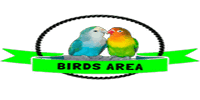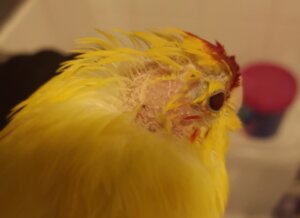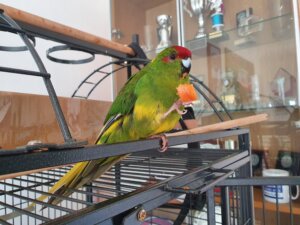Can Kakarikis Eat Watermelon? Discover the Surprising Truth
Yes, Kakarikis can eat watermelon in moderation. This juicy fruit is safe and can be a refreshing treat for your feathered friend.
Ensure you remove the seeds and rind before offering it to them. Kakarikis, known for their playful nature, need a balanced diet to stay healthy. Adding fruits like watermelon can provide essential vitamins and hydration. Watermelon is rich in vitamins A and C, which are beneficial for their overall health.
Providing variety in their diet can also keep them engaged and happy. Before introducing any new food, it’s important to know the proper way to prepare and serve it. Let’s explore how watermelon can fit into your Kakariki’s diet and the best practices to follow.

Credit: www.youtube.com
Introduction To Kakarikis
Kakarikis, also known as New Zealand parakeets, are small, vibrant birds. Their lively nature and colorful feathers make them popular pets. They are social and intelligent, needing mental stimulation and interaction.
Unique Characteristics
Kakarikis have several unique characteristics. They are known for their bright green plumage and red patches on their heads. Their playful behavior and constant activity set them apart from other birds.
These birds are also excellent flyers and climbers. Their curiosity and playful nature require a lot of space and toys to keep them entertained.
Dietary Needs
Kakarikis have specific dietary needs. A balanced diet is crucial for their health. Their diet should include:
- Seeds: A mix of various seeds provides essential nutrients.
- Fruits: Apples, pears, and berries are great choices.
- Vegetables: Leafy greens, carrots, and peppers are important.
- Pellets: Commercial pellets ensure a balanced diet.
Watermelon can be a treat for Kakarikis. It is rich in water and can keep them hydrated. Always offer it in moderation and ensure no seeds are present.

Credit: www.tiktok.com
Watermelon As A Fruit
Watermelon is a popular summer fruit. It’s juicy, sweet, and refreshing. Many people enjoy it as a snack or dessert. But can Kakarikis eat watermelon? Let’s explore this topic by looking at its nutritional profile and health benefits.
Nutritional Profile
Watermelon is low in calories and rich in vitamins. It’s mostly made up of water, about 92%. This makes it hydrating for both humans and birds.
| Nutrient | Amount per 100g |
|---|---|
| Calories | 30 |
| Water | 92% |
| Vitamin C | 8.1mg |
| Vitamin A | 569 IU |
| Potassium | 112mg |
Health Benefits
Watermelon offers many health benefits. It helps with hydration due to its high water content. Kakarikis need to stay hydrated, especially in warm weather.
Vitamin C in watermelon supports the immune system. It helps Kakarikis fight off infections. Vitamin A is good for their vision and skin health.
Watermelon contains antioxidants like lycopene. These help reduce inflammation and protect cells from damage.
In summary, watermelon is nutritious and beneficial. It can be a healthy treat for Kakarikis in moderation.
Kakarikis And Watermelon
Kakarikis are lively and curious birds. They enjoy a varied diet. Owners often wonder if watermelon is safe for them. Let’s explore this topic in detail.
Suitability Of Watermelon
Is watermelon safe for Kakarikis? Yes, it is. Watermelon is a safe treat. It is not toxic to these birds. However, moderation is key. Too much fruit can upset their stomachs.
Nutritional Value For Kakarikis
Watermelon provides many nutrients. It is mostly water, which helps with hydration. Here is a breakdown of its nutritional content:
| Component | Benefits for Kakarikis |
|---|---|
| Water | Keeps them hydrated |
| Vitamins A and C | Boosts immune system |
| Fiber | Aids digestion |
| Antioxidants | Reduces inflammation |
Vitamins A and C are essential. They help in maintaining a strong immune system. Fiber aids in digestion. Antioxidants reduce inflammation.
Remember to remove seeds. They can be a choking hazard. Also, feed small pieces. Large chunks can be difficult to eat.

Credit: www.reddit.com
Benefits Of Watermelon For Kakarikis
Watermelon is a delightful treat for humans and birds alike. For Kakarikis, this juicy fruit offers several benefits that contribute to their health and well-being. Including watermelon in their diet can provide essential nutrients and hydration, making it a valuable addition to their meals.
Hydration
Watermelon contains a high water content. This is particularly beneficial for Kakarikis. Birds need to stay hydrated to maintain their health. Eating watermelon helps them stay hydrated. This can be especially important during hot weather. It ensures they do not suffer from dehydration.
Vitamin Content
Watermelon is rich in vitamins. It contains vitamins A, B6, and C. These vitamins play a crucial role in a bird’s health. Vitamin A supports good vision and immune function. Vitamin B6 is important for brain health. Vitamin C helps in maintaining healthy skin and feathers. Offering watermelon to Kakarikis provides them with these essential nutrients.
Potential Risks
Feeding Kakarikis watermelon can pose potential risks. High sugar content may lead to obesity and digestive problems in these birds.
Feeding your Kakariki watermelon can seem like a treat. Yet, it has potential risks. Knowing these risks can help keep your bird safe and healthy.Sugar Content
Watermelon contains high sugar levels. Birds, like Kakarikis, should not have too much sugar. Excess sugar can lead to obesity. It can also cause diabetes in birds. Always limit the amount of watermelon you give.Choking Hazards
Watermelon seeds can be a choking hazard. Kakarikis have small throats. Seeds can get stuck and cause choking. Always remove seeds before feeding watermelon. Cut the fruit into small, bite-sized pieces. This will make it safer for your bird to eat. “`Serving Watermelon To Kakarikis
Watermelon is a juicy and refreshing treat that many birds enjoy. Kakarikis, with their vibrant personalities and curious nature, are no exception. This delightful fruit can provide hydration and a burst of vitamins. But, it’s important to serve it correctly. Let’s dive into how to prepare and serve watermelon to your feathered friends.
Preparation Tips
Start by selecting a ripe watermelon. Ensure it is free from bruises and soft spots. Wash the watermelon thoroughly to remove any pesticides or dirt from the skin. Then, cut the watermelon into small, manageable pieces for your Kakariki.
Remove all seeds from the watermelon. Seeds can pose a choking hazard to birds. Also, avoid giving them the rind, as it can be tough and difficult to digest. Finally, ensure the pieces are small enough for your Kakariki to handle easily.
Serving Size
Moderation is key when serving watermelon to your Kakariki. Offer small amounts to prevent overfeeding. A few small cubes, about the size of a fingertip, are sufficient for a single serving.
It is wise to serve watermelon as a treat rather than a staple food. This ensures a balanced diet for your bird. Too much fruit can lead to an imbalance in their diet.
| Serving Size | Frequency |
|---|---|
| 2-3 small cubes | Once or twice a week |
By following these guidelines, you can safely treat your Kakariki to the sweet and hydrating benefits of watermelon. Enjoy watching your feathered friend relish this tasty snack!
Alternative Fruits For Kakarikis
Finding the right fruits for your Kakarikis can be a delightful journey. While watermelon is a treat, there are many other fruits these birds can enjoy. Offering a variety of fruits ensures they get the necessary nutrients.
Safe Options
Many fruits are safe for Kakarikis. Apples, pears, and grapes are excellent choices. Always remove seeds and pits to avoid any harm. Berries, like blueberries and strawberries, are also safe. Kiwi and mango provide a sweet and nutritious option. Remember to wash all fruits thoroughly before serving.
Nutritional Comparisons
Different fruits offer various nutrients. Apples are rich in fiber and vitamin C. Pears are also high in fiber and have a soft texture. Grapes provide hydration due to their high water content. Blueberries are antioxidants powerhouses, aiding in overall health. Mangoes offer vitamins A and C, supporting vision and immune function.
Each fruit has unique benefits. Mixing them ensures a balanced diet for your Kakarikis. This variety keeps their meals exciting and nutritious.
Frequently Asked Questions
Can Kakarikis Eat Watermelon?
Yes, Kakarikis can eat watermelon. It is safe and hydrating for them. Remove seeds before feeding.
Is Watermelon Good For Kakarikis?
Watermelon is nutritious for Kakarikis. It provides hydration and vitamins. However, feed it in moderation.
How Often Can Kakarikis Eat Watermelon?
Kakarikis can eat watermelon occasionally. Offer it as a treat, not as a main diet staple.
Should Watermelon Seeds Be Removed?
Yes, remove watermelon seeds before feeding. Seeds can be a choking hazard for Kakarikis.
Conclusion
Feeding watermelon to your Kakarikis can be a delightful treat. This juicy fruit provides hydration and essential nutrients. Always remove seeds and offer small pieces. Moderation is key to a balanced diet. Kakarikis enjoy variety, so mix watermelon with other fruits.
Monitor your bird’s reaction to new foods. Happy and healthy birds thrive on diverse diets. Consult your vet for specific dietary advice. By giving watermelon occasionally, you can keep your Kakarikis satisfied. Enjoy watching them relish this refreshing snack!
Hello Dear, I'm Poli Kolymnia, owner of many birds (including budgies).
With a deep passion for these feathered companions, I'm here to share my expertise and extensive knowledge on birds care.
My articles cover essential topics like diet, housing, care, and health, providing practical tips to help you create a happy and thriving environment for your birds.






